David Jonsson: ‘I’m the first black lead in an Agatha Christie – it’s scary’
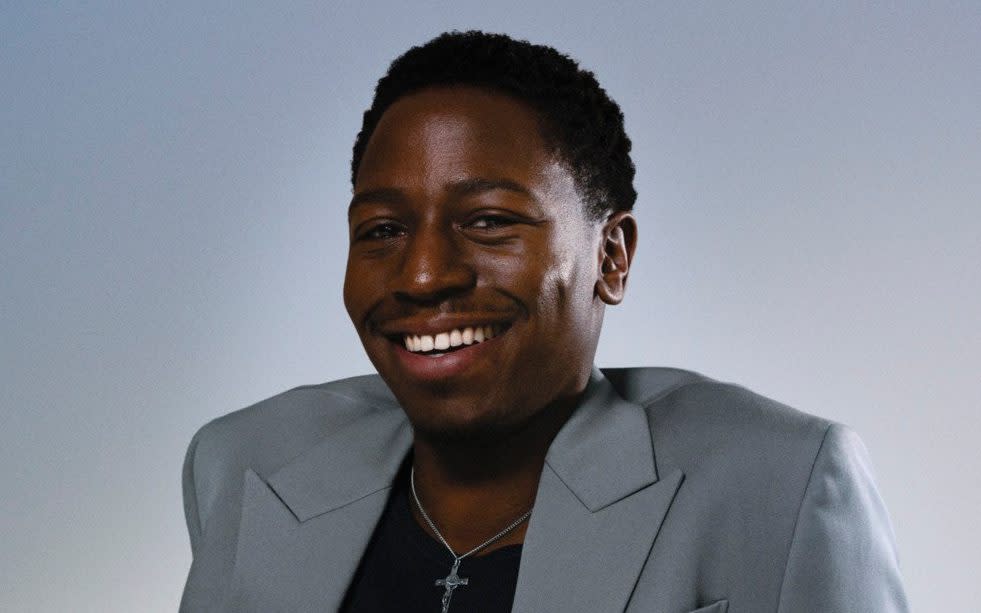
- Oops!Something went wrong.Please try again later.
- Oops!Something went wrong.Please try again later.
When David Jonsson was 14, he was expelled from his school in east London.
‘I was fighting,’ he explains. ‘Quite a lot. It was just something you did back then. We almost had our own fight club. Play fights would become serious. We did our best to make sure the teachers didn’t clock on, but they did.’ After being
suspended several times, he was permanently excluded, to the horror of his father, an IT engineer, and especially his mother, who was in the Metropolitan Police.
‘My mum was sad, very disappointed to say the least,’ he says. ‘Being a police officer, she was not a fan. She was devastated because she worked really hard. She asked me what I was going to do with my life. It hit me so hard, because disappointing her is something I never want to do.’
The brawling, tough-talking teenager Jonsson describes is hard to reconcile with the adult man in front of me at a café in west London. Today Jonsson – one of Britain’s fastest-rising talents; star of the BBC and HBO’s feted banking drama Industry, award-winning rom com Rye Lane and now, this Christmas’s BBC Agatha Christie adaptation, Murder Is Easy – is polite to the point of diffidence. He smiles constantly, shakes off compliments like a Labrador leaving a lake, and wears his khaki baseball cap low over his eyes. He doesn’t seem like much of a fighter, I suggest.
‘Thank you, that’s kind,’ he laughs. ‘Don’t worry, I’m not going to start on you. I was a relatively smart kid. It was more that I got distracted. You are a product of your surroundings. Nowadays I don’t care about being cool. But then you do. You’ve got to fit in.’
In the end, the incident might have been the making of him. His parents sent him to a different school, as predominantly white as his old one was black, an hour and a half away in west London. ‘I love the East End and black culture. It is very close-knit: one for all and all for one. But sometimes it doesn’t make room for more than what we know or what we can see. Coming to a school in west London I’d get a completely new sense of life when I was here. Then I’d go back to the East End and be hard again. It was half-in, half-out.’
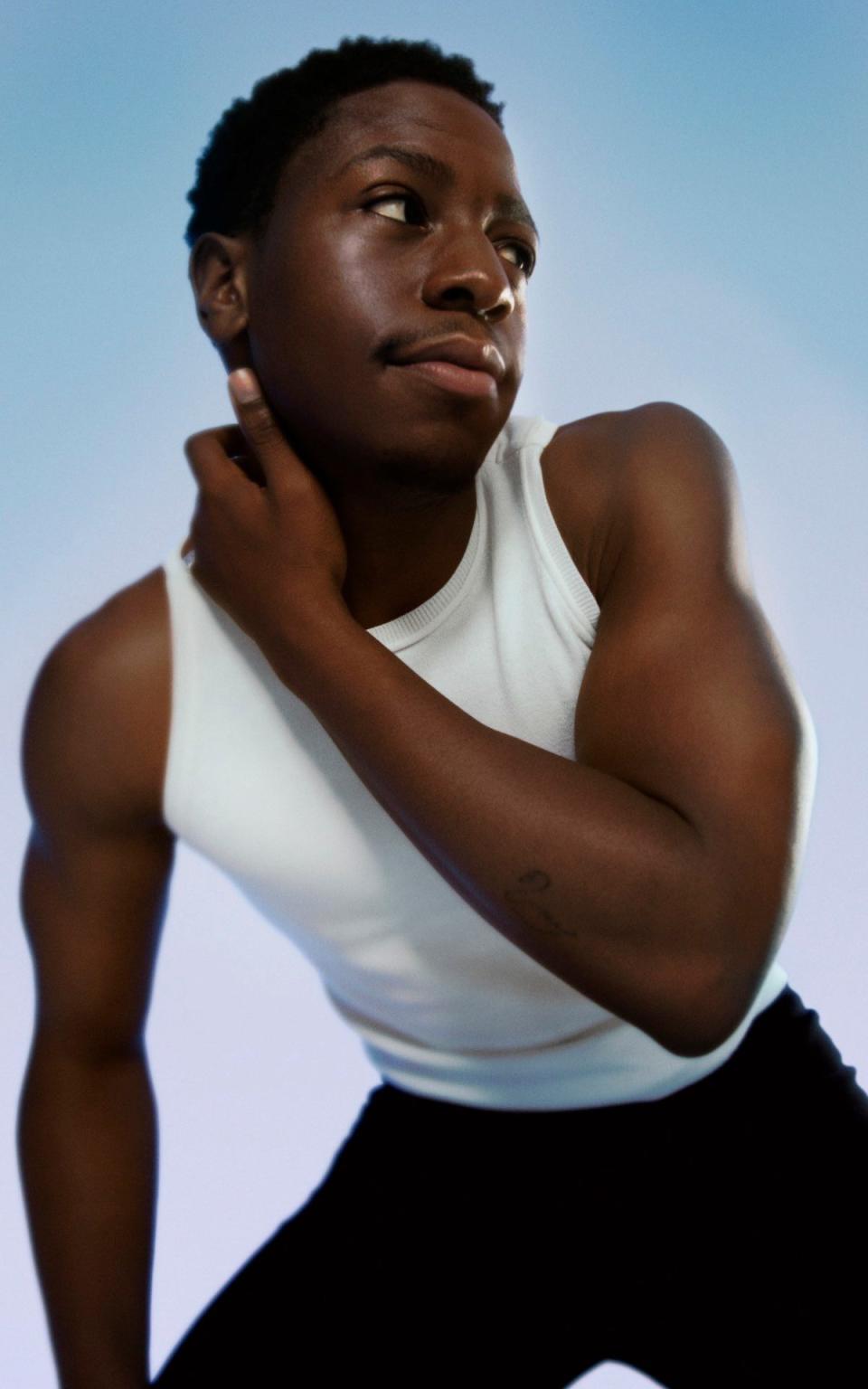
Jonsson, who is the youngest of four, two girls and two boys, had also realised he was interested in acting. ‘It wasn’t a massive surprise when I told [his parents], they just told me to be serious about whatever I decided to do.’
It sounds like that journey to school, from Custom House to Hammersmith, was an exercise in code-switching – not the worst thing for a man hoping to act.
‘It was,’ he says. ‘But honestly, I look back on it and I wouldn’t have it any other way. I still have some really close mates in east London and they have all spoken about what a struggle it is to do something beyond this tiny boundary of success, where the jobs are basically joiner, scaffolder, stuff like that. It’s about expanding your mind: what you think you can do versus what you actually can do.’
This year Jonsson takes on the BBC’s big-budget Agatha Christie adaptation. Its annual-ish update of a classic story, with a starry cast, has become one of the highlights of the festive season. Previous years have included The Witness for the
Prosecution (Andrea Riseborough and Kim Cattrall), The ABC Murders (John Malkovich and Rupert Grint) and The Pale Horse (Rufus Sewell and Clare Skinner).
In Murder Is Easy, Jonsson plays Luke Fitzwilliam, a detective who over two episodes must unpack a series of murders in Wychwood-under-Ashe. The rest of the cast includes Penelope Wilton and Morfydd Clark, the star of Amazon’s gazillion-dollar Lord of the Rings spin-off.
‘They got in touch and told me they wanted to do something extraordinarily different with Agatha Christie,’ Jonsson says. ‘At first it really shocked me to the point I didn’t want to do it. It’s the first time they’ve had a black lead in the entire history of Agatha Christie. I love Agatha Christie, and my mum does in particular. It’s a British institution. But it was scary. The last time Fitzwilliam was portrayed, Benedict Cumberbatch played him. I’m not Benedict Cumberbatch. So to put me on screen like that there have to be certain things included – not to make political points but just so it’s authentic. It’s set in 1954, when there were insane amounts of racism and prejudice, fear of the unknown. I think it’s wonderfully done, I don’t think it’s heavy handed, I don’t think it’s going to make people throw up their Christmas dinner.
‘The thing about firsts is that there is so much room for it to be bad, terribly bad. I’m not scared of being bad but I’m scared of not being with the right people to make it right. But on the flip side of that, that’s also what made me want to do it. Because it is a first, and if it was done badly, I’d have thought I should have done it, because hopefully I’d have done something better.’
In giving a familiar text such a radical treatment, is he worried about the reaction? Television viewers can be a fickle bunch when it comes to the classics, especially at Christmas, when families are more likely to eschew their personal Netflix accounts temporarily and settle in to watch something all together.
‘With everything I’ve done, I always anticipate some kind of pushback,’ he says. ‘It’s not entirely safe. Hopefully people adore it… but you never know.’
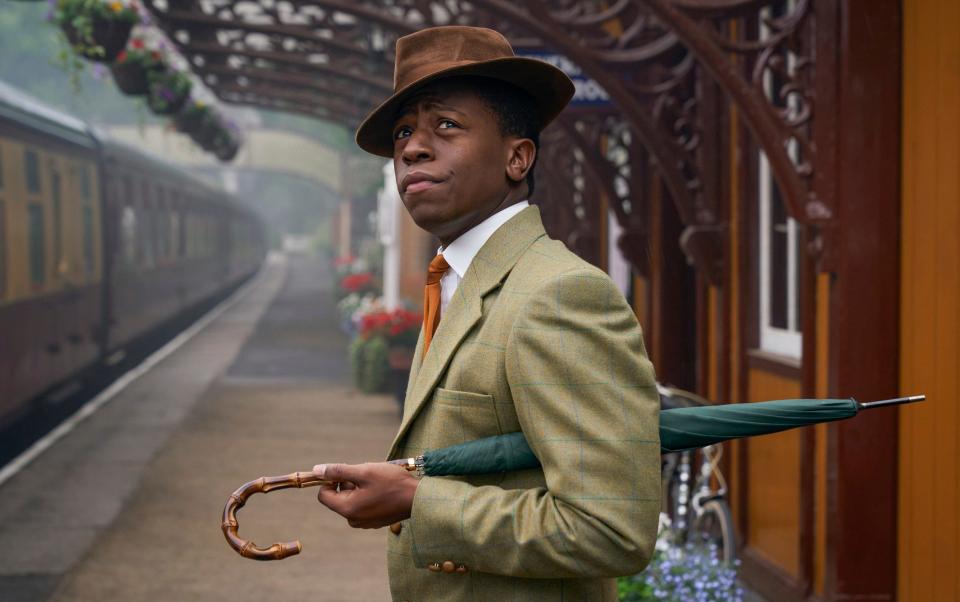
Firsts are becoming a habit. After Jonsson realised he wanted to act, his mother recovered from the shock of his expulsion enough to encourage him in his new plan. He performed in plays at his new school, then spent two years on a scholarship at the American Academy of Dramatic Arts in New York. Drama school, he says, grew his interest in poetry and Shakespeare. ‘Part of what’s good about drama is finding new words for your experience. Being 16 you are feeling so much, about girls and everything else, then you read Hamlet and you’re like, “Ohhh, that’s what that feels like.” I would just sit after school reading poems.’
When he got back to the UK and joined the National Youth Theatre, Jonsson, by now 18, had interest from agents who were keen to push him into professional work as quickly as possible, but went with one who was prepared to wait while he went to Rada. He left slightly early, in 2016, to appear in the wunderkind theatre director Robert Icke’s version of Schiller’s Mary Stuart. The usual tentative TV appearances followed: an Endeavour here, a Fox espionage thriller, Deep State, there.
He came to wider attention in 2020 as one of the stars of Industry, whose first season aired on BBC Two, a high-octane drama set in the well paid but unforgiving world of London investment banking. Jonsson played Gus, a gay young Tory who has his path to a great office of state clearly mapped, fresh out of Oxford. He was part of an ensemble of young talent: Marisa Abela, who played Gus’s colleague Yasmin, will star as Amy Winehouse in a biopic set for release next year. Harry Lawtey, who played another colleague, Robert, will be in the sequel to the Oscar-winning Joker.

‘I feel an intense sense of gratitude to [Industry creators] Mickey Down and Konrad Kay,’ Jonsson says. ‘What we get to do is so special. You know how many people went to my drama school and haven’t managed to do anything, not because they’re not talented, but because you need people to trust you? Mickey and Konrad did that. We couldn’t have been greener. We went out to Wales where it was being shot and Lena Dunham, who was directing the first episode, said, “I think this is going to change your lives.” And it did.’
If Industry proved Jonsson could play an Eton- and Oxford-educated would-be master of the universe, Rye Lane, which was released in March this year, expanded his repertoire even more. Drawing on Notting Hill and Before Sunrise, it is a touching rom com about a young couple falling in love over a single day in south London. Jonsson plays Dom, recently heartbroken, who is weeping in a loo when he meets Yas (Vivian Oparah). He was nominated for a British Independent Film Award for his performance, and has been tipped for the Baftas, too.
‘I remember reading the first line of the script, which described the character as “good-looking in an awkward way”, and I thought, “That’s not promising – that can’t be me.” But I read it and it was this strange romantic comedy set in Peckham. It’s gratifying, not only because it’s a bit of a cultural progression in movies, but [because it] shone a light on what I can do. I find it mental that people are comparing it to Richard Curtis’s films. In many ways it couldn’t be more different. You’ve got these two dark-skinned black leads in the central roles, it’s set in Peckham, not Notting Hill, and somehow you can draw parallels with this wonderful film. It’s bizarre, but I love it.’
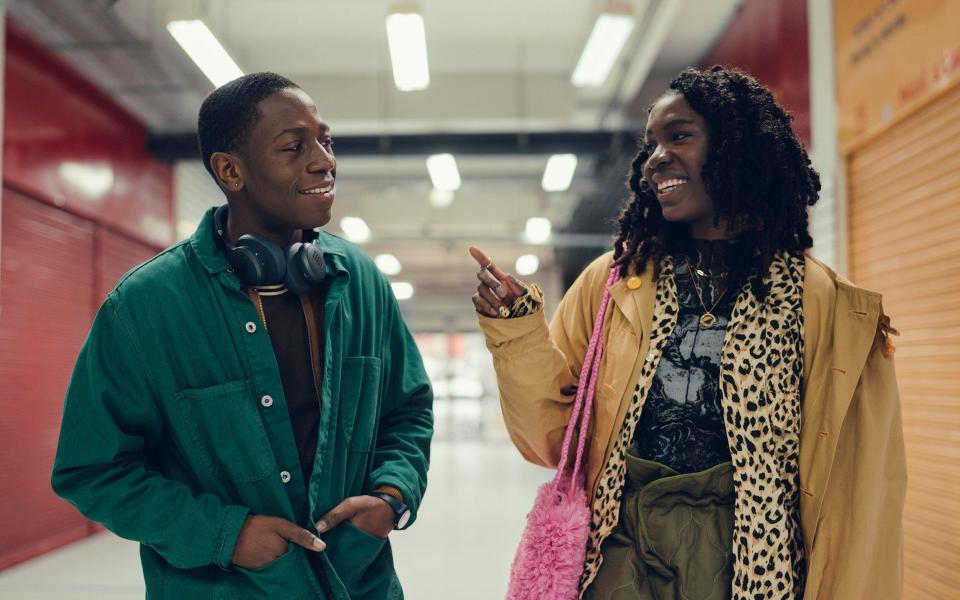
As naturally as unflinching finance drama leads to rom com, so rom com will lead to outer space. Next year Jonsson will get even more international attention in Alien: Romulus, the latest in the saga begun by Ridley Scott in 1979, and Jonsson’s first studio film. ‘I never read the cover page of a script because I don’t want to psych myself out,’ he says. ‘So I read it blind. I thought it was cool. Then I found out it was Alien. Everyone gasped when I told them. It’s comforting, but it’s also scary.’
It was not so long ago that black actors had to go to America to hunt down the kinds of varied leading roles that Jonsson has slid into with apparent effortlessness. Idris Elba and David Harewood, among others, have both spoken about the difficulties they faced earlier in their careers. Elba had to go to America to find his HBO breakout – with The Wire – before he got his own crack at an Alien film in Prometheus. In Jonsson’s case, the HBO opportunity came to the UK.
‘We stand on the shoulders of giants,’ Jonsson says. ‘People have gone over there and broken down doors. I go over there and there’s a buzz. But 10 years ago it wouldn’t have been the same.’
In one case, this lineage is set to become crystallised. David Harewood is down to direct a biopic about the boxers Nigel Benn and Chris Eubank, and cast Jonsson as Eubank. Apart from getting in shape, the actor’s biggest challenge will be getting under the skin of a man who is frequently portrayed – not least by himself – as a lisping, monocle-wearing cartoon.
‘He’s a Peckham boy, got into trouble in school a lot, then decided to reinvent himself,’ Jonsson says. ‘Apart from getting into trouble at school, I don’t really have any parallels to him. I mean, do I?
‘He is almost like a pantomime villain sometimes, but I don’t want to play that. It’s more about finding out who you are as a person growing up. He was a hungry young black man who wanted something greater for his life. That I can understand.’
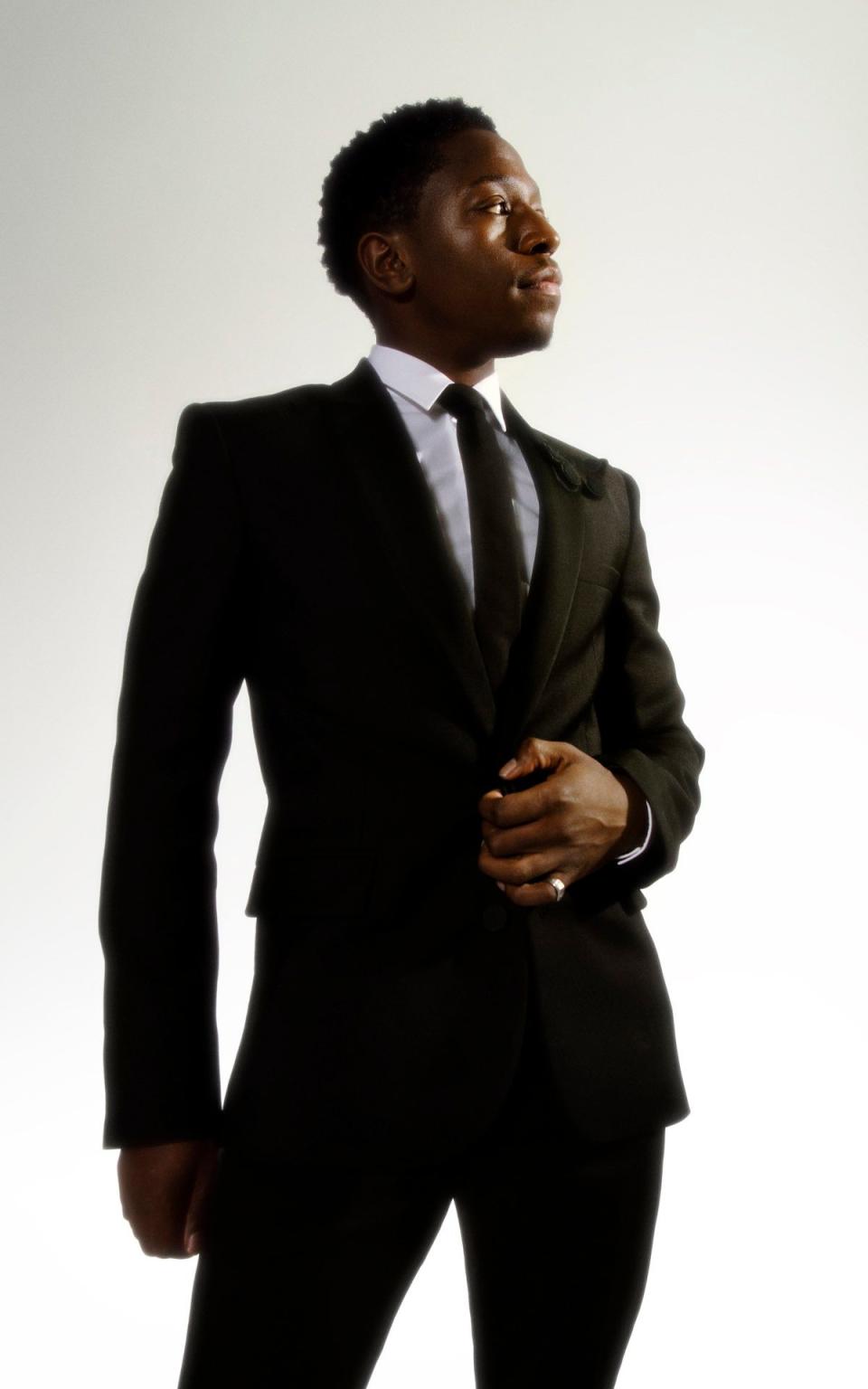
If Jonsson’s performances have a through-line, it’s that his characters all feel slightly out of place, as if afraid they’ll be exposed as a fraud, at work or in love. I wonder if his interview mode isn’t another kind of performance, playing the East End kid being asked about how he left the East End. But he has little reason to be nervous, at 30 and with the world at his feet. Soon after we speak, he is an honouree at GQ’s Men of the Year awards.
As far as the proceeds of his career go, he has bought a flat in Muswell Hill, north London. Motorbikes and cars are his vice. ‘It’s very “basic boy”, but I can’t help it.’ He hasn’t really had time for dating, despite his mother’s entreaties for him to find someone and settle down. His parents have moved past any short-term frustration they had with their 14-year-old son.
‘They struggle to understand my career, but they love it,’ he says. ‘They came to the Rye Lane premiere and were beyond themselves, that this place where we used to buy our meat from is now the star of a film I was in. They were incredibly proud, which made me happy.’
Before he leaves, I ask about a tattoo of a swan on his arm.
‘They’re the biggest, most hard-working animal, but they make it look easy,’ he says. ‘I think that’s quite cool.’
Murder Is Easy is coming to BBC iPlayer from 6am on Wednesday 27 December, and will be broadcast on BBC One at 9pm that evening, with episode two broadcast the following night

